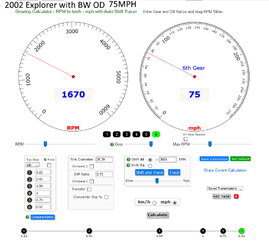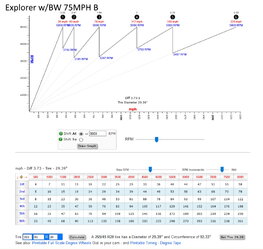OK This is an area I am very well knowledgeable about. I have done a fair amount of work on this subject.
First tire and wheel changes: From a search:
How does changing tire size affect speedometer?
Changing tire size is one of the most common things car owners
do that can
affect speedometer accuracy. That's because larger tires cover more ground in one complete revolution. When your
speedometer reads 60 miles per hour, your car will actually be traveling 67.7 miles per hour!
Regarding this, how much does speedometer change with bigger tires?
When you go to
bigger tires the circumference of the
tires is larger, meaning the distance around the tire
is longer. Thus, with each revolution you
are traveling further than before. Therefore your actual speed
is higher than your
speedometer reads. Or lower if you have gone with
a smaller tire than stock.
Similarly, how does wheel size affect speed? Newton's Second Law dictates that the force on an object is equal to its mass multiplied by its acceleration. So, increasing your
wheel size will decrease the driving force from your
wheels which will culminate in a decrease in acceleration of said
wheels.
In this regard, how does changing tire size affect odometer?
This can also
affect your
odometer and speedometer as larger tires will have a larger circumference, causing you to travel a little bit further per each complete
tire rotation. This also will cause your
odometer to register fewer miles than you are actually traveling.
How much does tire size affect RPM?
So you'll be increasing
tire size by 10%, so you'll decrease engine speed by 10% too. Assuming you're running about 3000
rpm at 70 mph with the small
tires, you'll drop 10% with the big
tires. 10% of 3000 is 300, so you'll go down to 2700
rpm.
Electronic Speedometer
- Determine the distance of the test drive needed to recalibrate your speedometer.
- Press and hold the calibration button on the speedometer, start the vehicle and release the button.
- Press the button again and drive the distance prescribed by the speedometer manufacturer.
And the
wider the
tire the higher the rolling resistance is and the harder the engine has to work to move the
tire, thus decreasing the car's
fuel efficiency.
Larger tires can in fact,
increase a vehicle's
gas mileage if the vehicle is regularly traveling with consistent speeds over 60
miles per hour.
Any reputable mechanic who records results properly and can produce a valid report may run a speedometer calibration on your vehicle. Though it costs about
$75 and lasts about an hour, obtaining a calibration report could help your defense.
Up-sizing or Down-sizing
Up-sizing, or installing a taller tire, will lead to a
speedometer reading that is
slower than
your actual speed. This is because a taller tire will have a
larger overall circumference, which will cause it to travel more distance per revolution than the original equipment tire.
Do smaller tires affect gas mileage?
How
Do Wheels
Affect Gas Mileage? For example, larger
tires decrease your
fuel economy because they are heavier, while
smaller tires increase
fuel efficiency. Bigger
tires also have a higher rolling resistance than
smaller tires which means they require more resistance and effort to get them rolling.
33" OEM Tires
| Speedometer | 35" Tires | 37" Tires |
|---|
| 30 MPH | 33.9 MPH | 35.8 MPH |
| 45 MPH | 50.8 MPH | 53.7 MPH |
| 60 MPH | 67.7 MPH | 71.6 MPH |
How far off is my odometer with bigger tires?
Divide
your old tire diameter by
your new tire diameter. Subtract
from 1. This will be
the %
your odometer is
off. If
your vehicle
odometer registers 250 miles and it takes 16 gallons to fill…
Assuming
you've gone 1 or 2″
bigger than
the original size,
you're
tires are now going to be lower profile
tires.
If your wheel and tire package ends up being heavier, this will affect acceleration and fuel economy. Acceleration will be less and so will fuel economy. Steering may also become heavier.
Depending on the axle, the next lowest
ratio from a 4.10:1 is most likely the 4.56:1, which
should be selected for towing and performance. Because of the extra weight associated with off-road
tires, we usually recommend going with a performance-minded
gear ratio for any
tire size above
35 inches.
No
speedometer can be 100 percent accurate. But, if a car is modified, its
speedometer may need to be recalibrated.
Changing tire size is
one of the most common things car owners
do that
can affect speedometer accuracy. That's because larger
tires cover more ground in
one complete revolution.
Can wrong size tires damage transmission?
Tires do matter,
incorrect tire sizes can cause serious
damage to your vehicle not to mention a safety hazard. Putting on the
wrong size tires on some cars and trucks
will destroy the
transmission cause
damage to the suspension.
Your
warranty would not be
voided by getting bigger tires. That's just nonsense.
Changing your
tire size shouldn't
void your
warranty unless they
can somehow prove that the larger tires caused something to fail. Pretty unlikely with the
tire size you are talking about.
Are Bigger tires bad for your truck?
A
larger tire size can make
your truck look and perform better in some situations. But changing tire size too much can affect speedometer and odometer accuracy, handling, steering response as well as safety issues such as tire load capacity.
Yes,
smaller wheels accelerate faster, but it doesn't matter. A 29” wheel has more mass at a larger radius from the centre of rotation (the hub), and thus has a higher moment of inertia than a
smaller wheel and is harder to get moving. So yes, bigger
wheels will
accelerate more slowly.
How to Size Your Tires
- Multiply the width by the aspect ratio expressed as a decimal (225 x 0.55 = 123.75).
- Convert the aspect height to inches (123.75 / 25.4 = 4.87).
- Multiply the aspect height by 2 (4.87 x 2 = 9.74).
- Add the inside diameter of the tire (16 + 9.74 = 25.74).
- Repeat for the size of the new tire.
It's pretty
accurate, considering that your phone is triangulating satellites 22,500 miles up. I have not noticed a difference in my car's
speedometer versus
Waze. Since 60 mph = 1 mile per minute, you can test the
accuracy of your
speedometer with a good stopwatch along a road with known
accurate mileposts.
It's possible to
change the
size of your
tires without actually
changing the diameter. Generally,
you don't want to go with
tires that have a diameter that is more than 3% different from the factory
tires. It's also a good idea to consult with a trusted mechanic before switching to larger or smaller
tires.












